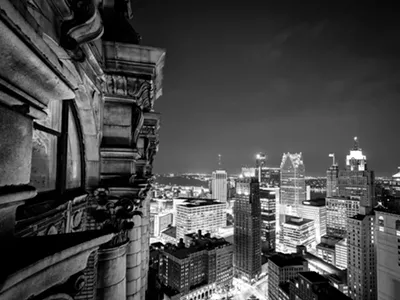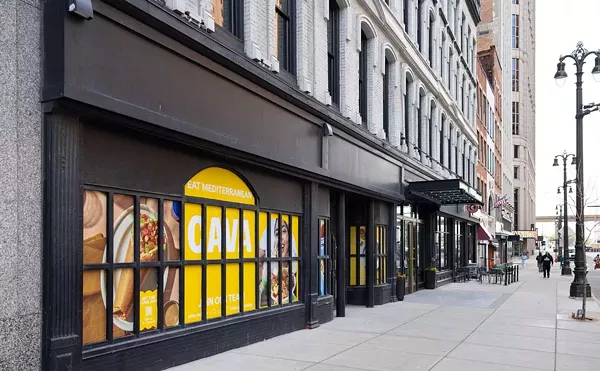The Hinterlands Ensemble may have created the oddest, most offbeat theatrical experience in Detroit
Crowded house

Audio By Carbonatix
[
{
"name": "GPT - Leaderboard - Inline - Content",
"component": "35519556",
"insertPoint": "5th",
"startingPoint": "3",
"requiredCountToDisplay": "3",
"maxInsertions": 100,
"adList": [
{
"adPreset": "LeaderboardInline"
}
]
}
]
The Hinterlands Ensemble is anything but a typical theatrical group. This "performance company" is composed of Dave Sanders, Liza Bielby, and Richard Newman, and they bring to bear their various backgrounds in theater, dance, music, and other media. The material they stage is bizarre, dark, and quite funny.
In the six years they've performed in Detroit, they've tried to push performance into uncharted territory, hence the group's name, which ensemble member Bielby says implies the idea of a place just off the map.
The show they performed this spring, and which they're bringing back for the fall, is one that's way off the charts. It takes place in an "art house" in the Banglatown neighborhood just north of Hamtramck, where several residences have been converted into offbeat artworks and living spaces. As if that weren't already odd enough, they've taken a hodgepodge of 1960s radical politics, Greek drama, performance art, and convention-busting theater and created something truly out-there.
In fact, the publicity for this show, contained in a press release, is by turns academic and self-lampooning, with references to "socialist pageantry" and gleeful obtuseness. It's enough to leave you laughing and scratching your head at the same time. There's obviously a lot going on here.
Their play is called The Radicalization Process, and it will invite small audiences into the house for a 90-minute experience intended to transport viewers outside the literal, rational world into a heady exploration of what it means to defy authority. After the doors open, audiences will be guided into a basement "archive," were more than a dozen boxes of research will help prepare them for the play.
"We just tell people the piece starts in the basement," Bielby says. "That's where you can go through the archives. There are 22 boxes of archived material. The idea isn't to go through all the boxes, although somebody tried!" The boxes contain radical history, materials on method acting, and information about the play Antigone. Then the group will be led upstairs to watch a very physical piece of performance hung on the frame of that ancient play. It may be the only play we've heard of preceded by a research period.
As those familiar with the play by Sophocles know, the drama hinges on King Creon's wartime edict that corpse of the dead warrior Polynices remain unburied on the battlefield, and Antigone's violation of that decree when she buries her brother's body, for which she is buried alive.
The themes of war and defiance of the state made Antigone a popular play after World War II. Brecht's version was explicitly antiwar, and Puerto Rican playwright Luis Rafael Sanchez cast Creon as a Latin American dictator. The play was especially popular during the Vietnam War, when the Living Theatre, an anarchist theater collective, staged its famous adaptation in 1968.
And then that play gets pulled into a somewhat new shape via the Hinterlands' collaborative process. Bielby describes the ensemble's pieces as centered around asking questions as opposed to driving home messages. In this case, the questions concerned the radicalization process. "We wanted to ask, 'How far are we willing to go for our beliefs? And is that far enough?'"
The group has performed the piece elsewhere in theaters and on stages, but it's perhaps best appreciated when seen at the Play House. That's because the trio actually helped transform the house, and came up with ideas for the play while doing so. "In a way, the play has become this love letter to that house," Bielby says. "There are things that happened while we were renovating that came into the piece. We've done the play in theater spaces, but in a way it is really connected to that house."
The play, of course, is challenging work, but it's designed to be funny as well as thought-provoking; for some people, it will no doubt be bewildering. But that's not a problem, as this group of radicals hopes to disrupt the status quo. Bielby tells us, "When you're disrupted, you get disoriented. But if you lose your way, paths open up and new ways of thinking can be tried out."
"We try to create a new language," she says, "to develop a language through the piece, and the sum of that language when put together at the end allows you to see something."
Despite the challenging nature of the show, Biebly says a surprisingly wide swath of people come to see it. Some, no doubt, appreciate the challenge the work presents, whereas others just enjoy the intimacy, the intensity, the dancing, and the joy.
"Some of it was we just wanted to liberate ourselves," Bielby says. As a boundary-pushing artist trying to ask questions about activism, she says some of the piece is a response to the current political climate: "It's really hard times right now. Things are dark. But also hilarious and insane, the way we're behaving as Americans right now. It's hard, weird times."
Perhaps that best explains why this show is often so strange, from the unusual lighting design to Richard Newman's sound design, which includes him playing live onstage on analog synthesizers and tuned glasses, along with sound loops and even turntables. But the Hinterlands Ensemble didn't create this oddity alone. They had help with set design by Shoshanna Utchenik, writer and poet Casey Rocheteau helped with archives, and graphic designer Ben Gaydos helped prepare the actual print journal that figures in at the end of the piece.
It's something the group is proud enough of to offer a reprise of. When they were doing the show earlier this year, they attended a reading at MOCAD by poet Anne Carson, who Bielby says "did one of the best adaptations of Antigone." The group invited Carson to see the piece, and she did.
"When she walked out," Bielby tells us, "she said, 'That was very crazy.'"
Bielby adds: "I take that as a compliment."
The Radicalization Process is performed at 8 p.m. Wednesdays through Saturdays and at 2 p.m. Sundays from Friday, Sept. 23 until Saturday, Oct. 1, at 12657 Moran St., Detroit; tickets are on a sliding scale from $10 to $30; for reservations call 313-454-1756 or email info@thehinterlandsensemble.org. Seating is limited.





